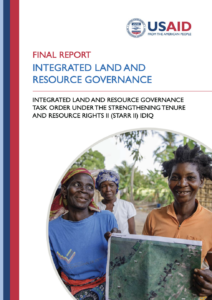 The United States Agency for International Development (USAID) Integrated Land and Resource Governance (ILRG) program, a five year (2018-2023) global mechanism, worked with government, private sector, nongovernmental organizations (NGOs), civil society, and community members to strengthen community-based land and natural resource management and advance land-based economic opportunities. Working through a buy-in based approach, with funding from various Washington Operating Units (OUs) and Missions, the geographic and activity scope evolved over time, beginning with initial tasks in Zambia and Mozambique and expanding to field level implementation in Ghana, India, Liberia, Madagascar, and Malawi, as well as research engagements in Colombia, Peru, Democratic Republic of the Congo (DRC), and Indonesia. While country level activities varied, ILRG’s global portfolio largely centered around six key themes, often with multiple themes present in each country.
The United States Agency for International Development (USAID) Integrated Land and Resource Governance (ILRG) program, a five year (2018-2023) global mechanism, worked with government, private sector, nongovernmental organizations (NGOs), civil society, and community members to strengthen community-based land and natural resource management and advance land-based economic opportunities. Working through a buy-in based approach, with funding from various Washington Operating Units (OUs) and Missions, the geographic and activity scope evolved over time, beginning with initial tasks in Zambia and Mozambique and expanding to field level implementation in Ghana, India, Liberia, Madagascar, and Malawi, as well as research engagements in Colombia, Peru, Democratic Republic of the Congo (DRC), and Indonesia. While country level activities varied, ILRG’s global portfolio largely centered around six key themes, often with multiple themes present in each country.
ILRG set the stage for a number of lasting impacts post-project. The team helped advance a number of inclusive land and natural resource policies and strengthened the capacity of local organizations to take the lead on implementation. The project documented first time land rights for over 500,000 people (50 percent women), increasing tenure security and the potential for increased on-farm investments. ILRG adopted a holistic approach to gender and social inclusion, including the iterative development of a number of manuals/toolkits that are already being used and adapted by other implementing partners and donors in Zambia, Malawi, Mozambique, and India. Companies in the private sector, including PepsiCo in India, Grupo Madal in Mozambique, and Ecom Agroindustrial (ECOM) in Ghana, are taking activities forward using their own resources.

